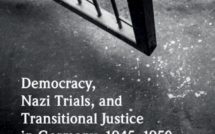

In this section of Campus, EuropeNow features a selection of scholarly articles and books on topics pertinent to the teaching of Europe or teaching in Europe that were published within the last 5 years. This dynamic bibliography, with monthly installments, seeks to highlight both pedagogy research as well as critical analyses of debates taking place in higher education in and about Europe.
If you are interested in reviewing any of the books featured in any of our Campus Round-Ups, please contact our Research and Pedagogy Chair, Hélène Ducros, at helene@alumni.unc.edu
1. The Pandemic, Race and the Crisis of the Neoliberal University: Study Notes from Lockdown London
By Ashwani Sharma
Abstract: The COVID-19 pandemic has brought into further crisis the contemporary global university. By focusing on the UK this article examines how this crisis has manifested itself in UK universities, with an increasingly problematic reliance on online teaching and learning. Further, simultaneously universities are being challenged by demands for racial justice and decolonisation following the Black Lives Matter global protests after the police killing of George Floyd. The article argues that the crisis is an opportunity to rework the relationship between pedagogy, technology, race, and cultural studies in local and transnational digital and cultural networks to resist the exploitation of global info-capitalism.
Find this article in Inter-Asia Cultural Studies here.
2. Attempting to Break the Chain: Reimaging Inclusive Pedagogy and Decolonising the Curriculum Within the Academy
By Jason Arday, Dina Zoe Belluigi, and Dave Thomas
Abstract: Anti-racist education within the Academy holds the potential to truly reflect the cultural hybridity of our diverse, multi-cultural society through the canons of knowledge that educators celebrate, proffer and embody. The centrality of Whiteness as an instrument of power and privilege ensures that particular types of knowledge continue to remain omitted from our curriculums. The monopoly and proliferation of dominant White European canons does comprise much of our existing curriculum; consequently, this does impact on aspects of engagement, inclusivity and belonging particularly for Black, Asian and Minority Ethnic (BAME) learners. This paper explores the impact of a dominant Eurocentric curriculum and the Decolonising the Curriculum agenda within higher education and its influence upon navigating factors such as BAME attainment, engagement and belonging within the Academy. This paper draws on a Critical Race Theory (CRT) theoretical framework to centralize the marginalized voices of fifteen BAME students and three academics of colour regarding this phenomena. Aspects examined consider the impact of a narrow and restrictive curriculum on BAME students and staff and how the omission of diverse histories and multi-cultural knowledge canons facilitates marginalization and discriminatory cultures.
Find this article in Educational Philosophy and Theory here.
3. Memory, Responsibility, and Transformation: Antiracist Pedagogy, Holocaust Education, and Community Outreach in Transatlantic Perspective
By Manuela Achilles and Hannah Winnick
Abstract: The ‘Unite the Right’ rally on 11 and 12 August 2017, shook the city of Charlottesville, Virginia, and spurred a national conversation about the long history of racial oppression in the United States and the future of its democracy. This article reviews the Transatlantic Partnership on Memory, Responsibility and Transformation, a collaboration between the Heinrich Böll Foundation North America and the Center for German Studies at the University of Virginia. Launched in response to the violent rally on the university’s grounds and in downtown Charlottesville, the partnership adds a transnational dimension to antiracist pedagogy and Holocaust education. Through interdisciplinary projects, it challenges students to translate classroom learnings into hands-on practice of participatory democratic citizenship in local communities. The partnership’s aim is to situate the study of memory and history in contemporary discussions of racial justice and responsible citizenship and to animate students to find urgency and relevance in the specific lessons of the Holocaust and in broader, transnational legacies of systemic oppressions. Starting with a discussion of the initiative’s origins in the aftermath of far-right violence, this article offers some of the lessons learned through the partnership, as well as recommendations for others who might wish to explore similar pedagogical practices and programing.
Find this article in The Journal of Holocaust Research here.
4. Confronting Whiteness: Antiracism in Medieval Studies
By Eduardo Ramos
Abstract: The field of medieval studies exists and functions under structural racism. The pervasive whiteness of the field treats the white perspective as ‘neutral’ and authoritative to the exclusion of alternate perspectives. This treatment not only drives people of color away from medieval studies, it also signals that white bodies are the rightful occupants of spaces associated with the Middle Ages. However, as the medieval past is increasingly politicized and utilized by violent white supremacists from beyond the academy, there is a growing need for medievalists to confront the whiteness of the field and respond by being antiracist. This article illustrates how practices within medieval studies uphold whiteness by excluding, silencing, and dismissing scholars of color, and how these practices inadvertently reinforce the views espoused by white supremacists outside the academy who co-opt the medieval past. It further argues for antiracist practices that challenge the association of whiteness with authority and make for more equitable academic spaces and intellectual engagement. By confronting whiteness and practicing antiracism, medieval studies can begin to dismantle the structural racism within the field and better respond to racist uses of the Middle Ages from beyond the academy.
Find this article in Postmedieval here.
5. Subjects, Subjectivities, and Slavic Studies: A Design for Anti-Racist Pedagogy
By Erin Katherine Krafft
Abstract: Folding together elements of anti-oppressive pedagogies and collaborative curriculum design, this contribution illuminates several possibilities for practicing anti-racism in the classroom while working with texts from Russian literature and history that do not necessarily center race. The identities and experiences of our students and ourselves, as well as the diverse forces that act upon us, are as important in the classroom as the texts in front of us, because our identities and experiences form the lens through which we interpret and interrogate. By framing this dynamic as a pedagogical tool, this contribution demonstrates that by engaging with Russian history and literature, students may gain critical perspectives on hierarchies of race, class, gender, and nation in their own lives and contexts while simultaneously discovering histories that they would not otherwise encounter, thereby broadening and deepening their sense of both global and national landscapes and their own positions and movements within them.
Find this article in Slavic Review here.




